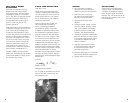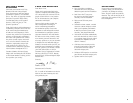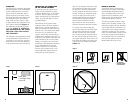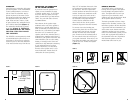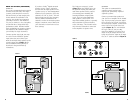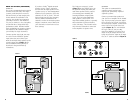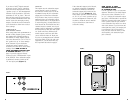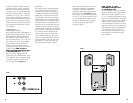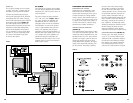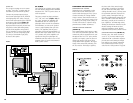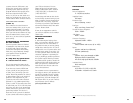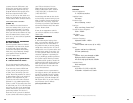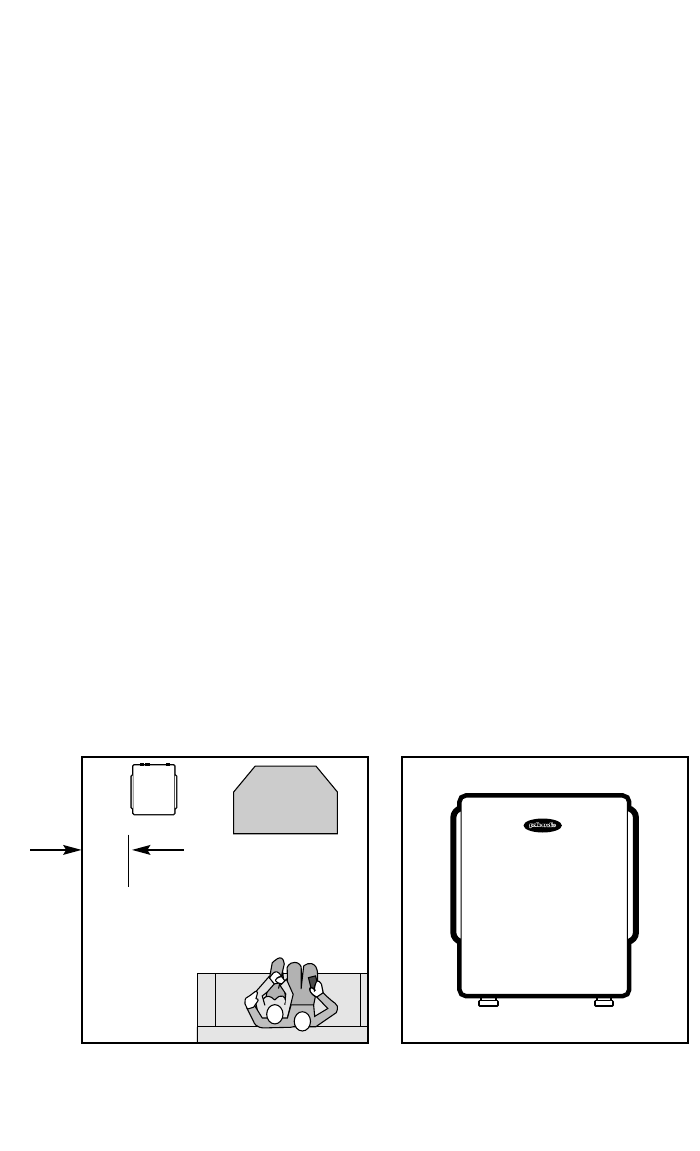
Strip 1/2" of insulation from each of the
two conductors on both ends to expose
the bare wire. Twist the exposed wire
of each conductor to form two un-frayed
strands. Connect two conductors to the
receiver or amp (refer to the owner’s
manual supplied with your electronics
for assistance with proper hookup).
Connect the two conductors on the
other end of the wire to the speaker
terminals. Repeat for the other channel.
To connect wire to the binding post,
unscrew the plastic hex nut on the bind-
ing post and insert the bare wire into
the hole near the base of the binding
post. Do not insert the insulated part of
the wire into the hole; this will not give
you a good connection. Twist the hex nut
back down the binding post until it firm-
ly meets the wire. Do not over-tighten.
(Figure 3.)
HOOK-UP OPTIONS
The PSW650 offers a wide range of
hook-up and use options. Each option
has advantages and potential down-
sides. The option that is best for you
depends on your electronics, main
speakers and your personal taste. Read
all the options before selecting.
The hook-up method will have a large
impact on the “blending” between your
main front speakers and the subwoofer.
A poor blend will sound unnatural; you
will be more aware that the main and
subwoofer speakers are two separate
units. In a well-blended system, you will
not be able to pinpoint the location of
the subwoofer in the mix. Experiment
with alternate options to find the
method that works best for you.
PLACEMENT
Polk PSW Series subwoofers offer many
placement options–in an entertainment
center, behind furniture, or next to a
sofa or chair. The subwoofer may be
placed anywhere in the room, but for
the greatest possible bass output place
the subwoofer near a corner of the
room. Allow at least 6 inches (15cm)
of space between any subwoofer driver
and a wall or obstruction (Figure 1).
The subwoofer should only be placed
on its feet. (Figure 2). NEVER LAY
THE SUBWOOFER ON THE AMPLI-
FIER END—THIS WILL DAMAGE
THE AMPLIFIER.
The PSW650 is not magnetically shield-
ed and should not be placed close to a
television set. If you see any color dis-
tortion in your TV, move the subwoofer
a few inches further away from the set.
CONNECTING THE SUBWOOFER
TO THE SYSTEM—GENERAL
If you elect to use the speaker level
inputs, use two-conductor 16 gauge
or thicker speaker wires. If you choose
to use the line level inputs, use high
quality, shielded RCA type interconnect
cables. See your Polk dealer for wire
recommendations.
Note that one of the speaker input
terminals on the rear of the speaker is
marked red (+) and the other black (-).
Make certain that you connect the wire
from the red (+) terminal of your ampli-
fier to the red (+) terminal on your
speaker, and the wire from the black (-)
terminal of the amplifier to the black (-)
terminal on your speaker. Most wire has
some indication (such as color coding,
ribbing, or writing) on one of the two
conductors to help maintain consistency.
If your subwoofer doesn’t seem to
produce much bass, it is most likely
that one of the speaker wires is con-
nected backwards. Double check all
connections for correct polarity.
4 5
FIGURE 2. FIGURE 2A.
FIGURE 3.
OK
FIGURE 1.
AMPLIFIER
Driver Side
≥
6 inches (15cm)
From wall
LOOSEN HEX NUT INSERT SPEAKER WIRE TIGHTEN HEX NUT DO NOT INSERT
THROUGH HOLE INSULATED SECTION
OF SPEAKER WIRE




